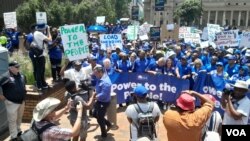JOHANNESBURG, SOUTH AFRICA — Hundreds of supporters of South Africa's opposition Democratic Alliance protested Wednesday over ongoing power cuts that are crippling the African continent’s most developed economy.
South Africa has been mired in an energy crisis for more than a decade, but it has accelerated this year, with the country experiencing daily scheduled blackouts – sometimes for as long as 10 hours a day.
Known here as “loadshedding,” the cuts are meant to reduce power on the strained grid.
Eskom, the cash-strapped and debt-ridden state power utility, is beset by aging coal plants that are prone to breakdowns. Corruption and sabotage have also weakened the utility considerably. Its CEO, Andre de Ruyter, is set to leave the job at the end of March.
Hundreds of protesters massed outside the headquarters of the ruling African National Congress party, blaming the government for failing to get the energy crisis under control. Among them was 48-year-old mother of four, Cynah Selomeleng.
“The loadshedding is affecting us so much, because the fridges are always ... we throw out the meat, we throw out the food, we have to iron for schoolkids to have the clothes," Selomeleng said. "So, you know it’s very difficult for us. Life is very, very difficult for us, even if the loadshed is there, we don’t have water. No electricity, no water, so how are we going to survive, you see? Yes, we want that to stop; they must stop that.”
Cassius Mmoko, a 40-year-old who works in construction, echoed her frustration.
“It’s really not acceptable, people are losing their jobs, some places go for some hours without electricity, things get messed up and the business doesn’t function," Mmoko said. "
Democratic Alliance leader John Steenhuisen told the crowd the energy crisis was destroying the country.
“Today, we’re here about a very important matter and that matter is energy," Steenhuisen said. "It’s a crisis that is putting our entire economy at risk. It’s a crisis that is pushing our people into poverty. It is a crisis that is stealing our businesses. It’s a crisis that is reaching into every single home.”
Earlier this week, President Cyril Ramaphosa said the government was looking at importing electricity but warned the problem couldn’t be solved “overnight.”




